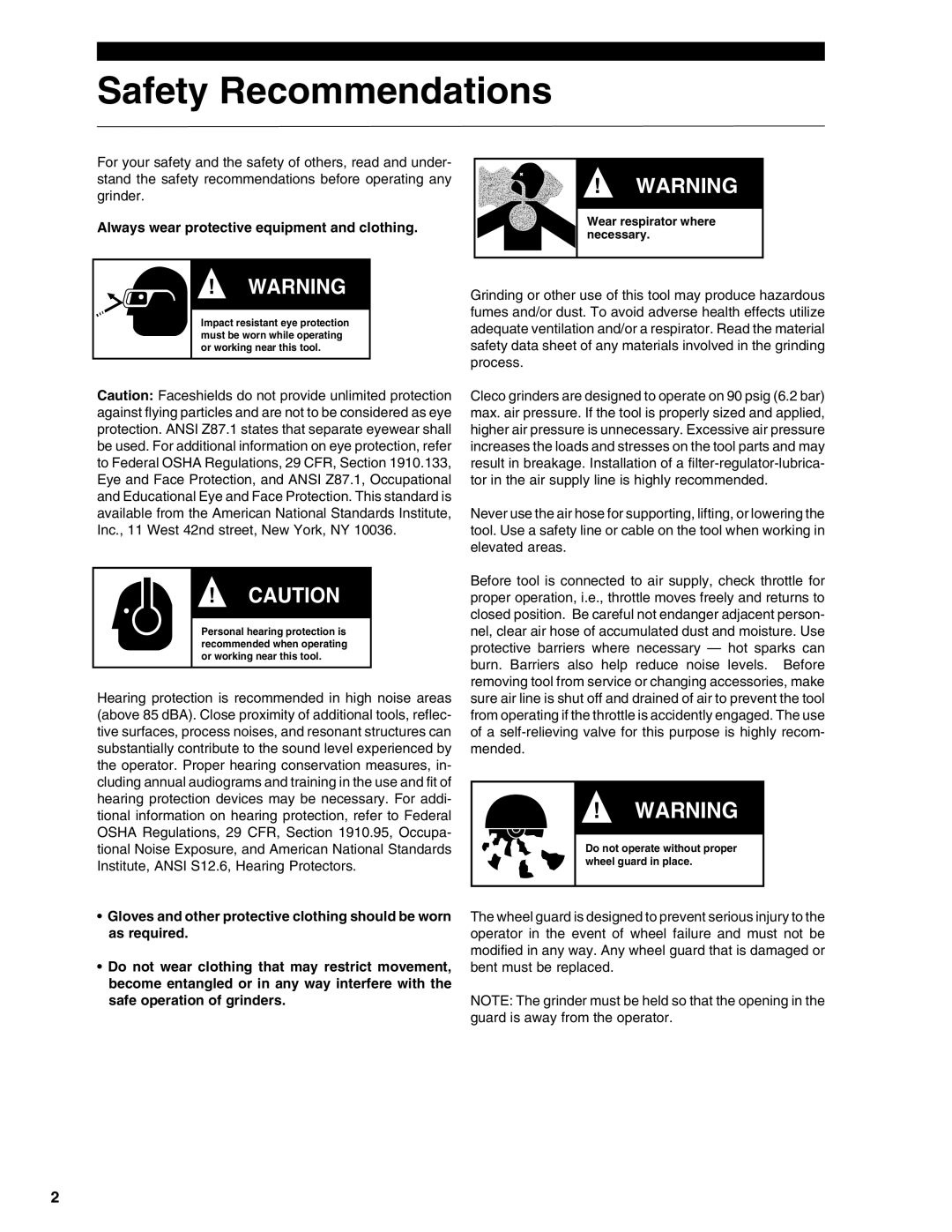
Safety Recommendations
For your safety and the safety of others, read and under- stand the safety recommendations before operating any grinder.
Always wear protective equipment and clothing.
!WARNING
Impact resistant eye protection must be worn while operating or working near this tool.
Caution: Faceshields do not provide unlimited protection against flying particles and are not to be considered as eye protection. ANSI Z87.1 states that separate eyewear shall be used. For additional information on eye protection, refer to Federal OSHA Regulations, 29 CFR, Section 1910.133, Eye and Face Protection, and ANSI Z87.1, Occupational and Educational Eye and Face Protection. This standard is available from the American National Standards Institute, Inc., 11 West 42nd street, New York, NY 10036.
! CAUTION
Personal hearing protection is recommended when operating or working near this tool.
Hearing protection is recommended in high noise areas (above 85 dBA). Close proximity of additional tools, reflec- tive surfaces, process noises, and resonant structures can substantially contribute to the sound level experienced by the operator. Proper hearing conservation measures, in- cluding annual audiograms and training in the use and fit of hearing protection devices may be necessary. For addi- tional information on hearing protection, refer to Federal OSHA Regulations, 29 CFR, Section 1910.95, Occupa- tional Noise Exposure, and American National Standards Institute, ANSI S12.6, Hearing Protectors.
•Gloves and other protective clothing should be worn as required.
•Do not wear clothing that may restrict movement, become entangled or in any way interfere with the safe operation of grinders.
! WARNING
Wear respirator where necessary.
Grinding or other use of this tool may produce hazardous fumes and/or dust. To avoid adverse health effects utilize adequate ventilation and/or a respirator. Read the material safety data sheet of any materials involved in the grinding process.
Cleco grinders are designed to operate on 90 psig (6.2 bar) max. air pressure. If the tool is properly sized and applied, higher air pressure is unnecessary. Excessive air pressure increases the loads and stresses on the tool parts and may result in breakage. Installation of a
Never use the air hose for supporting, lifting, or lowering the tool. Use a safety line or cable on the tool when working in elevated areas.
Before tool is connected to air supply, check throttle for proper operation, i.e., throttle moves freely and returns to closed position. Be careful not endanger adjacent person- nel, clear air hose of accumulated dust and moisture. Use protective barriers where necessary — hot sparks can burn. Barriers also help reduce noise levels. Before removing tool from service or changing accessories, make sure air line is shut off and drained of air to prevent the tool from operating if the throttle is accidently engaged. The use of a
! WARNING
Do not operate without proper wheel guard in place.
The wheel guard is designed to prevent serious injury to the operator in the event of wheel failure and must not be modified in any way. Any wheel guard that is damaged or bent must be replaced.
NOTE: The grinder must be held so that the opening in the guard is away from the operator.
2
